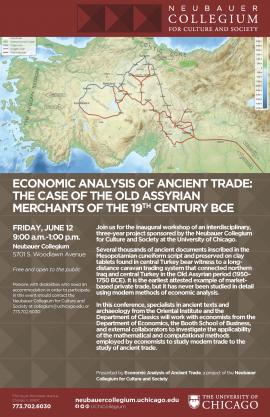A workshop on
Economic Analysis of Ancient Trade:
The Case of the Old Assyrian Merchants of the Nineteenth Century BCE
Friday June 12, 2015, 9:00 a.m. to 1:00 p.m.
Neubauer Collegium for Culture and Society
5701 South Woodlawn Avenue, Chicago, Illinois
Join us for the inaugural workshop of an interdisciplinary three-year project sponsored by the Neubauer Collegium for Culture and Society at the University of Chicago. Specialists in ancient texts and archaeology from the Oriental Institute and the Department of Classics will work with economists from the Department of Economics and the Booth School of Business, and with several external collaborators, to investigate the applicability to ancient trade of the mathematical and computational methods employed by economists to study modern trade. This project will build on the strengths of the University of Chicago in both economics and ancient studies. We will have biannual workshops and an international conference in the final year of the project to foster interdisciplinary methodological and theoretical discussions about the relationship between social institutions and economic behavior, past and present.
Serious engagement with economic data from the ancient world demands close collaboration between economists who know the analytical methods and ancient specialists who know how to interpret the documentary sources and reconstruct the cultural and institutional contexts of economic action. This kind of collaboration is rare but potentially very fruitful for both disciplines. We will pursue this in considerable depth over a sustained period using a large corpus of several thousand ancient documents inscribed in the Mesopotamian cuneiform script and preserved on clay tablets found in central Turkey. These documents bear witness to a long-distance caravan trading system that connected northern Iraq and central Turkey in the Old Assyrian period (1950–1750 BCE). It is the earliest attested example in world history of market-based private trade but it has never been studied in detail using modern methods of economic analysis.
In addition to the speakers listed below, the following people are involved in this project (all University of Chicago unless otherwise specified): Adam Anderson, Ph.D. candidate in Assyriology (Harvard); Alain Bresson, Robert O. Anderson Distinguished Service Professor, Dept. of Classics; Paul Gauthier, Ph.D. candidate in Assyriology; Emily Hammer, Director, Center for Ancient Middle Eastern Landscapes, Oriental Institute; Richard Hornbeck, Dunwalke Associate Professor, Dept. of Economics (Harvard); Alessio Palmisano, Postdoctoral Research Associate (Exeter); Sandra Schloen, Manager, OCHRE Data Service, Oriental Institute; Gil Stein, Professor of Near Eastern Archaeology and Director of the Oriental Institute; and François Velde, Senior Economist, Federal Reserve Bank of Chicago.
WORKSHOP PROGRAM
9:00 David Schloen Associate Professor of Archaeology, Oriental Institute, University of Chicago
Welcome and introduction to the project
9:15 Gojko Barjamovic Lecturer on Assyriology, Harvard University
Analyzing the Old Assyrian trade through its historical sources, part one: Constructive anomalies
9:45 Thomas Hertel Associate Professor of Assyriology, University of Copenhagen
Analyzing the Old Assyrian trade through its historical sources, part two
10:15 Edward Stratford Assistant Professor of History, Brigham Young University
Analyzing the Old Assyrian trade through its historical sources, part three
10:45 COFFEE BREAK
11:15 Miller Prosser Research Database Specialist, Oriental Institute, University of Chicago
Using the OCHRE system as a computational platform for ancient economic research
11:45 Kerem Coşar Assistant Professor of Economics, Booth School of Business, University of Chicago
Analyzing ancient trade with the toolbox of modern economics, part one
12:15 Ali Hortaçsu Ralph and Mary Otis Isham Professor, Dept. of Economics, University of Chicago
Analyzing ancient trade with the toolbox of modern economics, part two
1:00 LUNCH FOR ALL ATTENDEES


